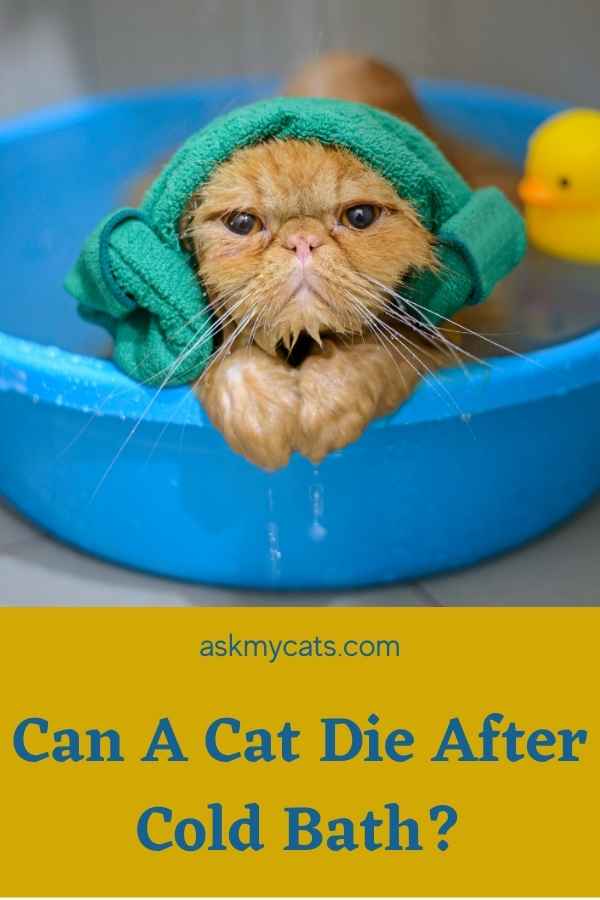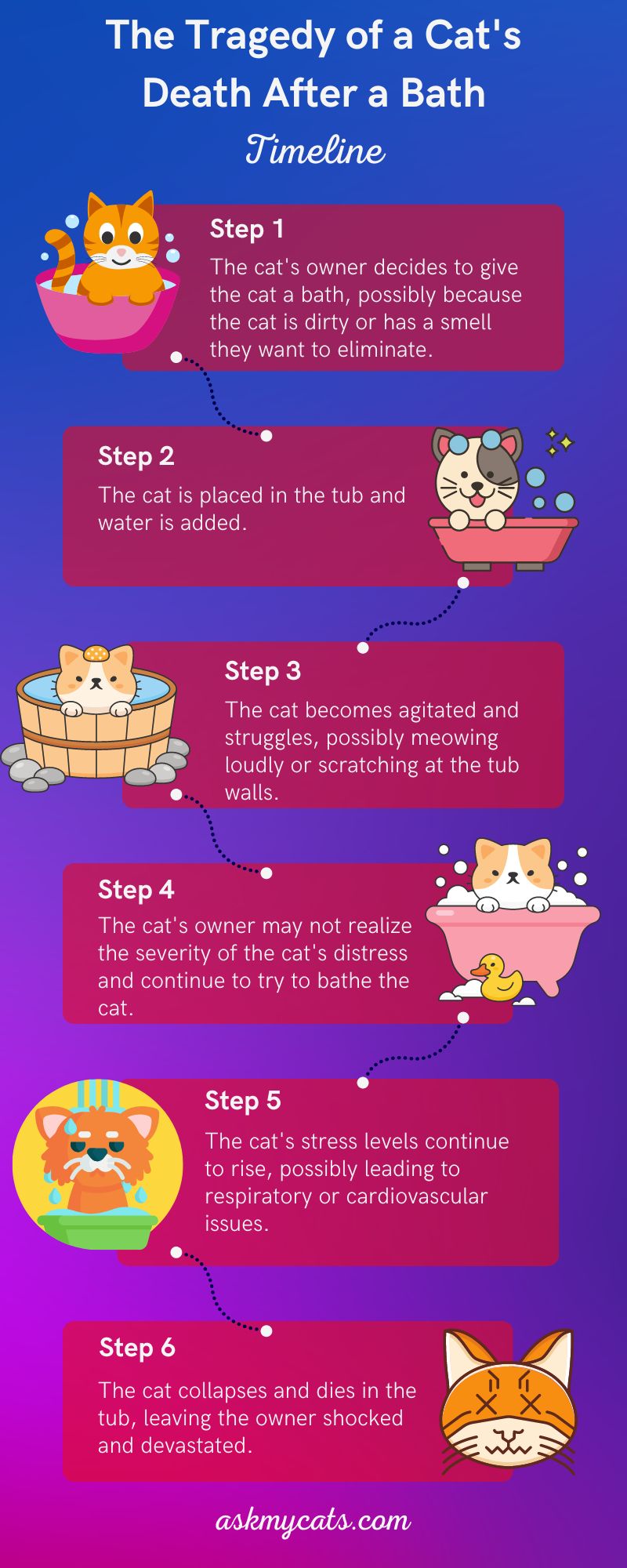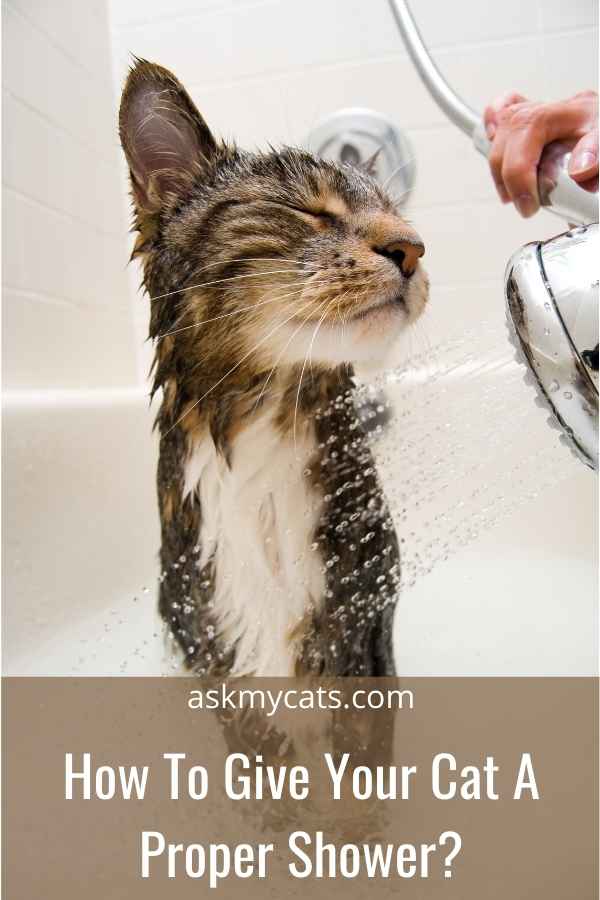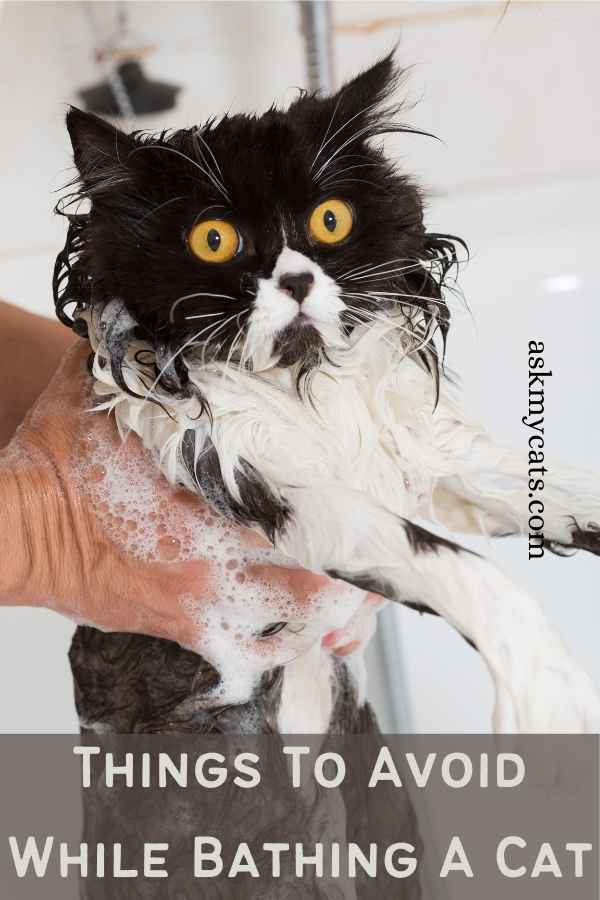It’s every cat owner’s worst nightmare: your furry friend gets a bath and doesn’t make it out alive.
That’s exactly what happened to one poor kitty, whose death has left its owner heartbroken and searching for answers.
While giving your feline friend a bath may seem like a harmless task, there are several potential risks and dangers that you should be aware of. From cardiac issues to stress and panic, there are many factors that can contribute to a cat’s death during or after a bath.
If you’re a cat owner, it’s essential to understand these potential risks and take the necessary precautions to keep your furry friend safe.
So, what could be the possible reasons for a cat’s death after a bath? Keep reading to find out.
Key Takeaways
- Cats may die during or after a bath due to various factors such as cardiac issues, stress, and panic.
- Cats hate baths because they are unfamiliar with water and dislike wet fur. Wet fur takes a long time to dry and is hard for cats to groom, making them uncomfortable.
- Cold water can cause a cat to go into shock and develop hypothermia, both of which can be dangerous or fatal.
- Kittens are more sensitive to the risks associated with bathing and may be more prone to allergic reactions, hypothermia, and stress.
- Consult with a veterinarian or professional groomer before attempting to bathe a cat.


Give Your Cat the Perfect Day
Get the Free Ebook!
Why Do Cats Hate Being In Water?
Domestic cats hate being in the water because they majorly stay in a dry climate and hardly come in contact with lakes or rivers. So water is unfamiliar territory for them and that’s why cats try to avoid water.
Water should not terrify all cats. Domestic cats, especially those living in hot, dry climates, enjoy the water. In hot climates, their big cat families love swimming.
Your cat might love soaking in the water because it is cool and refreshing. Cats who like to sit in the sink while cold water drips down on them are popular.
Hot water baths and massages can help arthritic cats relax.
Cats do not like bathing in colder temperatures because it makes them feel cold. Baths make them feel insecure and uneasy, which isn’t helping matters.
Why Do Cats Hate Bath?
Cats hate baths mainly because they are not much familiar with water and also don’t like wet fur.
Cats are the ones that spend a large amount of time grooming themselves.
Wet fur is extremely hard for them to groom which makes them highly uncomfortable.
Also, wet fur takes way long time to dry on itself which is the other reason cats tend to avoid bath and hate it.
Another possible reason behind a cat hating bath can be previous bad experiences associated with bathing. For example, falling into a bathtub full of water by accident can be a terrifying experience for your cat and make your cat fearful of bathing in the future.
Statistics Alert
Around 20% of cats have a negative or fearful reaction to being bathed, while the remaining 80% either tolerate it or enjoy it.
Interesting Read: Can I Bathe My Cat In Winter?
Can A Cat Die After Cold Bath?

It is possible for a cat to die after a cold bath, although it is rare.
Cold water can cause a cat to go into shock, which can be dangerous or even fatal if left untreated.
Additionally, if a cat is left in cold water for an extended period of time, it may develop hypothermia, which can also be dangerous or fatal.
It is important to use lukewarm water for a cat’s bath and to dry them off thoroughly afterward to prevent these risks.
Expert Quote
“Cats generally do not need to be bathed and can groom themselves effectively. Bathing a cat can be stressful and may even cause physical harm if not done properly. It is important to consult with a veterinarian or a professional groomer before attempting to bathe a cat.”
Dr. Jennifer Coates, veterinarian and pet health expert
Can Bathing A Kitten Kill It?
In general, kittens are more susceptible to the risks associated with bathing than adult cats.
This is because they are more sensitive to temperature changes, and they may not have the same coping mechanisms as adult cats to deal with stress or anxiety.
Additionally, kittens may be more prone to allergic reactions to soap or shampoo, and they are more vulnerable to developing hypothermia if left in cold water for too long.
However, it is important to note that the risk of death during or after a bath is very low for both kittens and adult cats.
Possible Causes Of Death Of Cats After A Bath
1. Stress or anxiety
Cats are creatures of habit, and they don’t always take kindly to change.
Being forced into a strange, unfamiliar situation like a bath can be extremely stressful for some cats.
In extreme cases, the stress can cause them to have a panic attack or even a heart attack.
2. Hypothermia
Cats are covered in fur, so they don’t handle cold water as well as we do. If the water is too cold or the cat is left in the tub for too long, it can start to get chilled.
This can lead to hypothermia, which can be dangerous or even fatal if left untreated.
3. Allergic reaction to soap or shampoo
Just like humans, some cats can have allergic reactions to certain ingredients in soap or shampoo.
If your cat has never had a bath before, it’s possible that it could have an allergic reaction to the products you’re using.
Symptoms of an allergic reaction can include difficulty breathing, hives, and swelling.
4. Ingestion of water while grooming
Cats are fastidious groomers, and they’ll often clean themselves up after a bath.
If they happen to swallow too much water while they’re grooming, it can lead to serious complications like pneumonia.
5. Heart attack
It’s rare, but it is possible for a cat to suffer a heart attack while being bathed. This is more likely to happen in older cats or cats with preexisting heart conditions.
The stress of the bath, combined with the shock of the cold water, can put too much strain on their little hearts.
Cat Shivering After Bath: Possible Reasons
If your cat is shivering after a bath, it could be due to a number of things.
Here are a few potential causes:
- The water was too cold: Cats are covered in fur, so they don’t handle cold water as well as we do. If the water was too cold, it could have caused your cat to start shivering.
- The cat is wet: Cats don’t like being wet, and they will often start shivering as a way to try and dry off. If your cat is shivering after a bath, it’s probably just because they’re wet and trying to get dry.
- The cat is stressed or anxious: Some cats get very stressed or anxious during baths, and this can cause them to shake or shiver. If your cat seems anxious or distressed during or after the bath, it could be the cause of their shivering.
- The cat is cold: If the room is cold and your cat is wet, it might start shivering in an effort to stay warm. In this case, it’s important to make sure your cat is wrapped in a warm, dry towel and placed in a warm room until they’re completely dry.
If your cat’s shivering persists or they seem to be in distress, it’s a good idea to consult with your veterinarian. They can help determine the cause of the shivering and recommend treatment if necessary.
Cat Lethargic After Bath: Possible Reasons
If your cat is lethargic or inactive after a bath, it could be due to a number of things. Here are a few potential causes:
- Stress or anxiety: Some cats get very stressed or anxious during baths, and this can cause them to be lethargic afterward. If your cat seems anxious or distressed during or after the bath, it could be the cause of their lethargy.
- Fatigue: Bathing a cat can be a physically demanding process, especially if they’re not used to it. If your cat is older or not in the best of health, it may become tired or lethargic after the bath.
- Allergic reaction: Some cats can have allergic reactions to soap or shampoo. If your cat has never had a bath before, it’s possible that it could have an allergic reaction to the products you’re using. Symptoms of an allergic reaction can include lethargy, difficulty breathing, hives, and swelling.
- Illness: If your cat is lethargic after a bath and is also experiencing other symptoms like vomiting, diarrhea, or loss of appetite, it may be sick. In this case, it’s important to consult with your veterinarian as soon as possible.
If your cat’s lethargy persists or they seem to be in distress, it’s a good idea to consult with your veterinarian.
They can help determine the cause of the lethargy and recommend treatment if necessary.
Factors That May Increase The Risk Of Death In Cats After A Bath
| Factor | Description |
|---|---|
| Age | Elderly cats may be more prone to hypothermia and other complications related to a bath. |
| Health status | Cats with underlying health conditions or a weakened immune system may be more at risk of complications from a bath. |
| Length of bath | The longer a cat is wet, the greater the risk of hypothermia. |
| Water temperature | Cold water can increase the risk of hypothermia, while very hot water can cause burns. |
| Shampoo/product choice | Using harsh or inappropriate products on a cat’s skin and fur can cause irritation or an allergic reaction. |
| Technique | Using improper technique during the bath (e.g. not supporting the cat’s head and neck) can lead to drowning or other accidents. |
The Tragedy of a Cat’s Death After a Bath: Timeline

How To Give Your Cat A Proper Shower?

Load the cat bath halfway with warm (but not hot) water and gently lower your cat into the water. Don’t overfill the bowl; this would just get your cat more agitated.
Throughout, offer lots of praise and reassurance. Bathing cats can be complicated, but food supplements, as well as another person holding the cat’s head and offering reassurance, can help.
Your cat may try to bite or scratch you if it is afraid. If this happens enough, interrupt what you’re doing and get advice from your veterinarian.
They might be able to bathe your cat for you or send you to a professional groomer who is familiar with anxious cats.
Just use a limited amount of shampoo and warm water to clean the infected spot. If you need to give your cat a complete body wash, ignore the head and focus on the rest of the body, including the tail, underside, and neck.
If you’re using a medicated shampoo that takes a few minutes to activate, you might find it easier to take your cat out of the water and into a towel for this portion.
Cotton wool, for example, should not be used to keep the cat’s ears dry. Not only is it likely that this will get stuck, but your pet will become stressed if they are unable to hear clearly.
It is much safer to keep their heads fully dry, and if their faces need washing, use only a moist cloth and no shampoo.
Use one hand to work the shower nozzle or pour a jug of warm, filtered water when they’re about to be rinsed, and the other to shield their eyes and ears from contaminants. If you’re using a cat conditioner, repeat the procedure.
It’s important to properly clean the shampoo and/or conditioner so your cat can lick off any extra water, and you don’t want them to absorb any suds!
Enable your pet to shake off the excess water until you’re certain that they’re fully rinsed. It’s as simple as that to bathe kittens!
OUR Recommendation
Keep your cat safe and calm during bath time with the Cat Bathing Bag. Its anti-bite and anti-scratch design will protect both you and your furry friend from any accidental injuries.
Get yours today and make bath time stress-free for all!
Expert Quote
“It is crucial to remember that cats are not dogs and cannot be treated as such. The stress of being placed in water and the physical handling required for a bath can be dangerous for a cat’s health.
If a cat must be bathed, it is important to use a feline-specific shampoo and to closely monitor the cat’s behavior and respiratory rate during the process.”
Dr. Sarah Wooten, veterinarian and animal behaviorist
Interesting Read: Can You Bathe A Pregnant Cat?
How To Prevent the Death Of A Cat After A Bath
1. Gradually acclimate your cat to baths
If your cat has never had a bath before, it’s important to give them time to get used to the idea.
Start by letting them sniff and investigate the tub, then move on to gently spraying them with a spray bottle of water.
Gradually increase the duration of the baths and the amount of water you use until they’re comfortable with the whole process.
2. Use lukewarm water and avoid getting water in their ears or face
Cats don’t like cold water, and they especially don’t like getting water in their ears or faces.
Use lukewarm water and try to keep their head and ears as dry as possible. If you do get water in their ears, use a cotton ball to gently blot it out.
3. Don’t leave your cat alone in the tub
Cats can be unpredictable, and it’s important to keep an eye on them while they’re in the tub.
If you need to step away for any reason, wrap them in a towel and take them with you.
4. Consider using a pet-safe shampoo
Not all shampoos are created equal, and some can be harsh on a cat’s delicate skin.
Look for a shampoo that is specifically made for cats and free of any harsh chemicals or fragrances.
If you’re not sure which shampoo to use, ask your veterinarian for recommendations.
OUR Recommendation
Don’t let your cat’s bathtime end in tragedy – try Arm & Hammer’s 2-in-1 Deodorizing & Dander Reducing Shampoo for Cats for a safe and effective grooming experience!
Steps To Follow After Your Cat’s Bath

In general, cats tend to be towel dry rather than blow-dried.
Unless they’ve grown up with a hair dryer, do the best you can with a towel and then leave them to dry naturally in a warm room.
To avoid catching a cough, don’t let them go outside until they’re completely dry.
You could find any inter-cat tension after bathing your cat if you’ve been bold enough to bathe more than one cat or simply have another cat in the home.
The difference in smell can do this, which can be remedied by dividing the bathed cats until they’re cool and then rubbing both cats with the same towel to redistribute scents.
How To Dry A Cat After A Bath
Drying your cat after a bath without damaging its skin and fur is the most important aspect of bathing a cat.
It’s irritating for your cat if you just give them a bath and don’t dry them. So it’s very important to learn to dry your cat quickly and comfortably.
Although drying your cat is not that hard and you just required one dry towel for this.
Here are simple steps to follow to dry a cat after a bath:
- Be prepared with a towel before the bath: Cat is quite impatient after a bath and so it is a good move to spread out the towel next to the bathtub beforehand.
- Prefer to use a warm towel (optional): Although it is not compulsory to use a warm towel always if you have a towel warmer, your cat loves to be wrapped in a warm towel after a bath.
- Wrap the cat in a towel: Put your wet cat on a towel and secure them with one hand as they try to squirm as soon as you put them on a towel. With your other hand try to enclose the cat with a towel as early as possible.
- Give time to calm down your cat: Once you wrap your cat in a towel, wait for some moments to calm down your cat before you start drying it. Make sure that your cat is wrapped properly in a towel so that don’t get cold.
- Squeeze the towel gently: Once your cat calmed, gently push the towel against the cat’s body to soak the moisture from cat fur. Never try to rub the towel back and forth as it might damage the fur.
- Spend some time in a warm room: Once you think that you have soaked most of the moisture from fur with a towel, unwrap your cat from a towel and put them in a warm room to complete the drying process.
- Never use a hairdryer: Blowing air through a hairdryer to make your cat dry quickly is highly avoided as it might damage the fur of your cat and also make your cat scared and aggressive with the sound of the hairdryer.
Cat Won’t Let Me Dry Him After Bath: Possible Reasons
If your cat won’t let you dry them after a bath, it could be due to a number of things.
Here are a few potential causes:
1. Your cat is anxious or stressed
Some cats get very anxious or stressed during baths, and they may be resistant to being dried off afterward. If your cat seems anxious or distressed, it could be the cause of its reluctance to be dried.
2. Your cat is cold
Cats don’t like being cold, and they may be resistant to being dried off if they’re still feeling chilled. In this case, it’s important to make sure your cat is wrapped in a warm, dry towel and placed in a warm room until they’re completely dry.
3. Your cat is in pain
If your cat is resistant to being dried and is also experiencing other symptoms like lethargy, loss of appetite, or difficulty moving, it may be in pain. In this case, it’s important to consult with your veterinarian as soon as possible.
If your cat is resistant to being dried and you’re not sure why, it’s a good idea to consult with your veterinarian. They can help determine the cause of the resistance and recommend treatment if necessary.
Do Cats Lick Themselves After A Bath?
Yes, it is common for cats to lick themselves after a bath.
Cats are fastidious groomers, and they will often groom themselves more thoroughly after a bath to remove any soap or shampoo residue.
Licking themselves also helps them to dry off and regulate their body temperature.
It is important to allow your cat sometime to groom themselves after a bath, but be sure to keep an eye on them to make sure they’re not swallowing too much water.
If your cat starts coughing or choking, or if they seem to be having difficulty breathing, it could be a sign that they have ingested too much water while grooming.
In this case, it’s important to consult with your veterinarian as soon as possible.
Why Do Cats Lick Themselves After A Bath?
There are a few reasons why cats lick themselves after a bath:
- To remove soap or shampoo residue: Cats are fastidious groomers, and they will often groom themselves more thoroughly after a bath to remove any soap or shampoo residue.
- To dry off: Licking themselves helps cats to dry off, especially if they’re still wet in hard-to-reach places like their back or tail.
- To regulate their body temperature: Licking themselves also helps cats to regulate their body temperature. The saliva on their fur helps to evaporate and cool their skin, which can be especially helpful if they’re still feeling a bit chilled after a bath.
- To mark their territory: Cats have scent glands in their paws, and licking themselves after a bath can help them to spread their scent and mark their territory. This is especially true for male cats, who have more scent glands than female cats.
Things To Avoid While Bathing A Cat

1. Do Not Inform Your Cat
You must approach the cat from behind, capture him, and smuggle him into the bathroom, where you can lock the doors, barricade him in, and turn on the shower.
If you have any cats to bathe after this one, put on some noisy music to block out the screams that will undoubtedly come from not just your pet, but most certainly you as well.
You don’t want to give away the next targets. I’m referring to other cats.
2. Filling The Tub With Water Is Not A Good Idea
There are many reasons why I caution against doing so. Sure, soaping him up and then dunking him clean sounds like a good idea, but I assure you it isn’t.
What follows will be a scene straight out of an Animal Planet alligator wrestling show, with the two of you grappling for your life while you try, in vain, to prevent his sharp teeth from biting you.
When attempting to contain the little beast, you can also collapse into the pool. I won’t elaborate on that, but I would suggest that no one should blame a person if anything like that occurs. During a life-or-death fight, you never know what could happen.
3. Showering With Your Cat Is Not A Smart Idea
I promise you that enclosing yourself in an enclosed space where your feline companion cannot run is not a fun solution to physically restraining your pet in the bathtub.
My cat freaked out at the water rushing beneath him into the drain and tried to mount me like a tree, so I learned the hard way.
Thankfully, I’ve blocked out much of the experience, but I do recall shouting at my boyfriend, “GET IT OFF OF ME,” and pacing around for the next week feeling like I’d fought a squirrel.
4. Do Not Pursue Pet Baths Unless You Have A Contingency Plan
Do not be fooled by the fact that your cat shrinks to half its original size when you add water.
Fluffy has maintained his strength and speed throughout his transition from a huge Persian pillow to a hamster with eyes that seem to be much too large for his body.
As you fight to maintain your skin in its original state while keeping him down, you’ll need an extra pair of hands to actually wash your feline pal.
You would even need someone to tend to your wounds if you lose a lot of blood.
5. When It Comes To Washing Kittens, Don’t Go Overboard
If you have some clever ideas, such as taping baby socks around your tiny feline friend’s paws to prevent getting bitten or bathing your cat while wearing snow boots, bird gloves, and maybe a face mask, forget it.
Now, I’m not suggesting that I tried any of all of these options; I’m merely stating that I’m reasonably confident none of them work. Regardless of how much you want them to. Have faith in me.
Interesting Read: Can I Bathe My Cat After Neutering Or Spaying?
How Many Times Can You Shower A Cat?
According to The National Cat Groomers of America recommendation, you can shower a cat every 4 to 6 weeks.
Most people believe that cat doesn’t like water and hates it. But it’s not true.
You need to train your cat to get used to water and bathing and that’s it.
Keeping your cat’s coat and skin healthy is equally important and that’s why you need to train your cat to have a bath every 4-6 weeks.
If you start training your kitten from a young age, actually your cat will enjoy bathing over a period of time and this regular grooming habit can help ease the stress and tension for you both.
Statistics Alert
According to a survey conducted by the American Pet Products Association, about 37% of cat owners give their cats baths at least once a month.
Is It Bad To Bathe A Cat Too Often?
Keeping your cat’s fur and skin healthy and clean is important for the overall health of your cat. But bathing your cat too often is not good for your cat’s health.
Cats are very clean pets and learn to lick themselves at the age of 2-4 weeks. Adult cats spent most of their time grooming and cleaning.
So giving a bath to a cat is actually not compulsory for you if your cat looks clean and healthy but still if you want to bathe a cat, your cat gives them every 4 to 6 weeks as mentioned above.
If you bathe a cat too often, it may lose essential oils from its coat which results in a traumatic experience for your cat and results in aggressive behavior.
Study Alert
A study published in the Journal of Feline Medicine and Surgery found that cats who are bathed more frequently are more likely to develop skin problems and infections, as their natural oils and protective barrier can be stripped away by frequent bathing.
The Risks and Rewards of Bathing Cats
| Risk | Reward |
|---|---|
| Cats may scratch or bite during bath time | Cats may have a cleaner and more pleasant smell after a bath |
| Cats may become anxious or distressed during the bathing process | Cats may have a healthier coat of fur after being bathed regularly |
| Cats may try to escape the bath, potentially causing injury to themselves or you | Cats may have fewer fleas or parasites if they are bathed regularly |
| Water may get into cats’ ears, leading to ear infections or ear mites | Cats may have fewer skin irritations or allergies if they are bathed regularly |
| The process of bathing a cat can be time-consuming and inconvenient | Bathing a cat may strengthen the bond between the cat and their owner |
Frequently Asked Questions
How do cats keep warm after a bath?
In general, cats tend to be towel drying rather than blow-dried. Unless they’ve grown up with a hair dryer, do the best you can with a towel and then leave them to dry naturally in a warm room.
Do cats like warm water or cold?
Like humans, many cats prefer their drinks to be frozen. If you serve it cold, you’ll inspire people to drink more water. It’s difficult to keep refilling your cat’s water tank, but fortunately, there are things on the market that can keep it chilled for hours.
What temperature should you bathe a cat?
When bathing a cat, it’s crucial to remember to use lukewarm water. Fill the bath with about five inches of wet, but not boiling, water. Place your cat in the bath with respect.
Why do cats hate water?
Cats are attracted to the flow of water and the noise it produces, according to behaviorists, which can trigger a cat’s instinctual need to capture prey. Even a cat who is normally afraid of water will like such play because only the cat’s paws get wet.
Final Words
Cats typically don’t require baths, although those conditions are unusual.
If you roll into stuff you can’t wash, or if you’ve got long hair that’s matted, a bath may be a smart idea. Many cats don’t like baths and the experience can be very unpleasant for them.
Did you face the same tragic incident where your cat died after giving him a bath? Do let us know in the comments section below!

Regarding using a hair dryer to dry your cat – I would say DO NOT DO IT! A few days ago I left one of my cats at a boarding facility close to my home for 3 days. I had asked them to bathe her while she was there. They used a hair dryer on her and she had a heart attack (out of fear I suppose) and died.
Be safe and use a towel please. Be kind to your cat. I can only imagine the fear that my cat had and I feel REALLY guilty for having them bathe and use a hair dryer on her. Part of the reason for her death was due to her older age (about 17 years) but still, this shows that you should not use a hair dryer at all…way too traumatic.
Sorry to hear about your loss.
And I am totally agree with you regarding not using hair dryer to dry a cat after bath.
Thanks for sharing your experience.
I took my 15 year old cat Boomer to a groomer she did not dry him off he was soaking wet and cold he died there soon after the bathing by the time I got there he passed away in front of me I’m so depressed he was my best friend either he had a heart attack or his body got too cold it cold of been prevented
After I bath my kitten why he scare me
Hello carla,
Usually cats are scared after bath as they are not used to be wet. So make them dry gently as quick as possible.
The reason that your kitten scares you after bath might be that he is not comfortable in that condition at that point of time. So make the environment in which your kitty is comfortable (which is by drying your kitty after bath gently).
Happy Cat Parenting